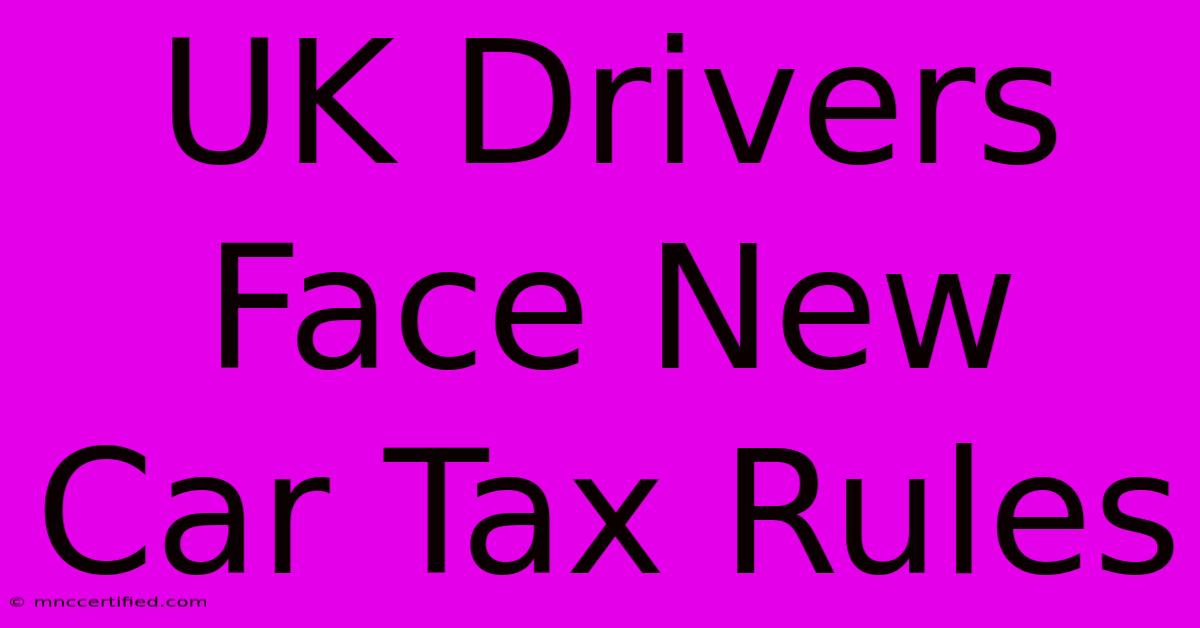UK Drivers Face New Car Tax Rules

Table of Contents
UK Drivers Face New Car Tax Rules: A Comprehensive Guide
The UK's vehicle tax system, often referred to as car tax or Vehicle Excise Duty (VED), is undergoing changes. These new car tax rules impact drivers across the country, introducing complexities and requiring careful consideration. This comprehensive guide will break down the key changes, helping you understand how they affect you and your vehicle.
Understanding the Changes to UK Car Tax
The UK government regularly reviews its vehicle taxation system to meet environmental goals and adjust revenue streams. Recent changes focus heavily on reducing emissions and encouraging the adoption of cleaner, more environmentally friendly vehicles. Key changes impacting drivers include:
1. Increased Emphasis on Emissions:
The primary factor determining your car tax is now its CO2 emissions. Lower emissions translate to lower tax bands and, therefore, lower annual payments. This shift emphasizes the government's commitment to reducing carbon footprints. You can find your vehicle's CO2 emissions on your V5C registration document or the manufacturer's website.
2. First Year Tax Rates:
The first year's road tax is significantly influenced by your vehicle's CO2 emissions. High-emission vehicles face substantially higher charges in their first year, acting as a deterrent to purchasing polluting cars. This "first-year rate" is a much more significant factor now compared to previous years.
3. Standard Rate for Subsequent Years:
After the first year, most vehicles fall into a standard rate determined by their CO2 emissions. However, vehicles registered before 2017 might still be subject to different rules, so it's crucial to check your specific circumstances using the government's online vehicle tax checker.
4. Electric and Alternative Fuel Vehicles:
Electric vehicles (EVs) and alternative fuel vehicles (AFVs) generally benefit from significantly reduced or even zero road tax. This incentive aims to accelerate the transition towards greener transportation. However, the exact rates are subject to change, so staying informed is vital.
How to Check Your Car Tax and Pay:
Navigating the new rules can feel overwhelming, but checking your car tax and making payments is straightforward:
- Use the Government's Online Vehicle Tax Checker: This service allows you to input your vehicle registration number to quickly and accurately determine your road tax liability. This is the most reliable method to avoid inaccuracies.
- Pay Online: The government's website offers a secure online payment system for convenient tax settlement.
- Tax Disc Abolition: Remember, physical tax discs are no longer issued. Your vehicle's tax status is stored electronically on the DVLA database.
Avoiding Penalties and Staying Compliant:
Driving without valid road tax is a serious offense, incurring significant fines. To avoid penalties:
- Pay on time: Ensure you pay your vehicle tax before the expiry date. Reminders are sent, but proactive payment is essential.
- Keep records: Maintain records of your tax payments and vehicle details for your own peace of mind.
- Update your details: Inform the DVLA promptly of any changes to your address or vehicle ownership.
Keywords for SEO Optimization:
- UK car tax
- Vehicle Excise Duty (VED)
- Car tax rules
- New car tax rules UK
- Road tax UK
- Car tax changes
- Electric car tax
- Alternative fuel vehicle tax
- CO2 emissions tax
- DVLA car tax
- Vehicle tax checker
- Pay car tax online
Off-Page SEO Strategies:
- Guest Blogging: Contribute articles on related topics to relevant automotive blogs and websites.
- Social Media Engagement: Share informative content related to car tax on social media platforms, encouraging interaction and discussion.
- Forum Participation: Actively participate in online forums where car owners discuss vehicle tax and related matters, offering helpful advice and insights.
- Link Building: Secure high-quality backlinks from reputable websites in the automotive and finance sectors.
This comprehensive guide provides an in-depth understanding of the new UK car tax rules. By staying informed and utilizing the resources available, UK drivers can ensure compliance and avoid potential penalties. Remember to always consult the official government website for the most up-to-date information.

Thank you for visiting our website wich cover about UK Drivers Face New Car Tax Rules. We hope the information provided has been useful to you. Feel free to contact us if you have any questions or need further assistance. See you next time and dont miss to bookmark.
Featured Posts
-
Quirion Insurance Augusta Maine
Nov 26, 2024
-
Finding And Hunting Doe Deer
Nov 26, 2024
-
Ladbroke Grove Shooting 8 Year Old Girl Injured
Nov 26, 2024
-
Barry Bonds Autograph Baseball
Nov 26, 2024
-
Police Update Incident Follow Up
Nov 26, 2024